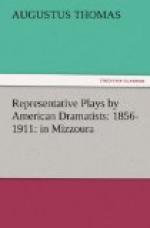“You ask why everybody who knows me is my friend? I might answer laconically that it was because they did not know me thoroughly, but, dismissing that defensive assumption of modesty, and making such self-inquiry as I can, I think I have a capacity for companionship from the fact that I was painfully poor as a kid. My consecutive schooling stopped when I was ten. I gave up all attempt to attend school even irregularly, when I was thirteen. Between that age and my twenty-second year, I worked in various sections of the freight departments of railways. Most of the mid-day meals of that time I took from a tin-bucket. This meal was in the company of freight-handlers on the platform, men recruited almost exclusively from the Irish at that time in the middle West; or the meal was with the brakemen in the switch shanties, these brakemen generally Americans rather near the soil; or was with the engineers and firemen in their cabs, or on the running-boards of boxcars with trainmen. Without knowing it, I acquired the ability of getting the other fellow’s point of view, and, when I got old enough not to be overwrought by sympathy that was inclined to be too partisan, I found an immense intellectual enjoyment in watching the interplay between temperament and environment. I think this answers your question. I have retained a gossip’s ability to be interested in most anybody else’s affairs.”
It is a strange combination—this democratic sympathy, with a later developed French finesse of technique, so clearly felt in comparing one of his “soil” plays, like “Alabama,” with a more finished product, like “As a Man Thinks.” The word “robustness” has been applied to Thomas, which recalls that when 10-cent melodrama was in flower on the American stage, the writer of “Convict 999” was called the Augustus Thomas of melodrama, and the inventor of “Jennie, the Sewing Machine Girl” was regarded as the Clyde Fitch of melodrama. Thomas is as careful in observing the small psychologies of men as Fitch ever was of women. There is a neatness, a finish to his small scenes that hint at a depth and largeness which he has never given rein to in any play he has thus far written. The consequence is, when he aimed at mental effect, the result was nearly always pompous, as when Dr. Seelig, in “As a Man Thinks,” tries to explain the psychological matrix of the piece, and as when Jack Brookfield, in “The Witching Hour,” explains the basis of telepathy. But when he aimed nowhere, yet gave us living, breathing flashes of character, as dominate “The Other Girl” and are typified in the small role of Lew Ellinger, in “The Witching Hour,” Thomas was happiest




